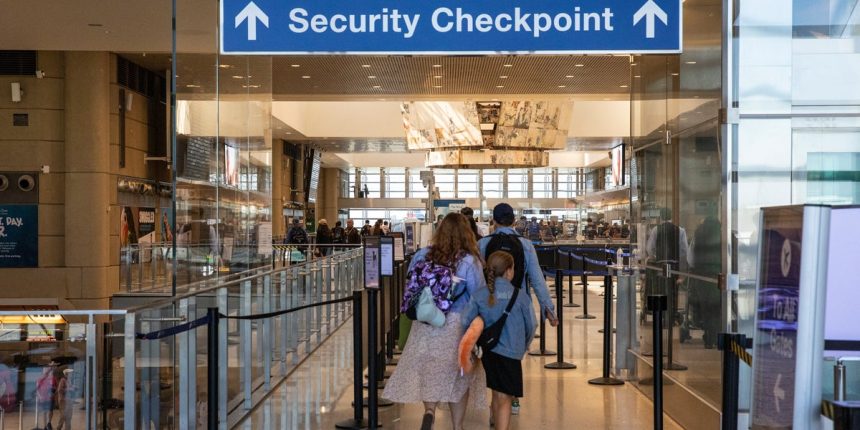If a U.S. border official questions you about what is on your phone, you need to be prepared by knowing your rights if you refuse to comply. stellalevi via Getty Images
Entering the U.S. as a traveler feels riskier than ever.
Following Donald Trump’s executive order for “enhanced vetting” in security screenings, U.S. border officials are empowered to use aggressive tactics at ports of entry like airports. In recent days, there have been alarming cases of legal immigrants and tourists who are being denied entry and detained in custody of U.S. Immigration and Customs Enforcement (ICE).
In one recent high-profile case, a French scientist who was traveling to Houston on his way to a conference was allegedly denied entry by Customs and Border Patrol over phone messages that criticized Trump’s science policies, according to France’s minister for higher education.
The Department of Homeland Security has denied that the scientist’s removal was based on his political beliefs. Tricia McLaughlin, a spokeswoman for Homeland Security, said the unnamed French scientist got denied entry because his device had “confidential information” from Los Alamos National Laboratory.
Nevertheless, it seems that these days securing your electronics before a trip should be as important as deciding which clothes to pack on vacation ― especially if you are traveling to the U.S. right now.
This month, Germany and the U.K. have even updated their travel advisories, warning their citizens that they could be liable to arrest or detention for breaking U.S. rules, and that legal permits do not guarantee entry into the United States.
“Have a plan before you travel, because you don’t want to be in the situation where you’re running late for a flight, you find yourself in secondary [screening], and you’re just like, ‘Oh, my God, I have to make this next flight, and I don’t know what to do besides comply,’” explained Saira Hussain, a senior staff attorney at Electronic Frontier Foundation who has represented travelers whose electronic devices were searched without warrants at a U.S. border.
No matter if you are a U.S. citizen, a visa holder or a foreign visitor traveling to Las Vegas on spring break, know what your rights are if a border agent asks to see your phone.
Yes, CBP can search your phone.
The U.S. government asserts that it has the ability to lawfully inspect phones, laptops and other types of electronic devices that cross U.S. borders.
“Any electronic device you own, including phones, laptops and tablets, can be checked at the border. Sometimes this means that customs officers will look at your device as is, but it can also involve trying to download its data,” said Petra Molnar, lawyer and author of “The Walls Have Eyes: Surviving Migration in the Age of Artificial Intelligence.”
Customs and Border Protection says searches of electronic devices are rare, but device searches have hit an all-time high this year. In 2025, the federal agency reported searching a total of 14,899 devices from April through June, which is almost a 17% spike over the previous three-month high in 2022. Of these devices searches, 13,824 were basic searches and 1,075 were advanced searches. Under a basic search, a border agent physically inspects your phone and reviews what they can, while an advanced search means the agent can potentially download all of your files using an external device.
Who is deemed suspicious enough to necessitate an electronics search can vary. The American Civil Liberties Union has represented a military veteran, an artist, a NASA engineer, journalists, Muslims and people of color who had their devices searched at a border. A 2017 NBC News investigation found 25 cases where border agents directed U.S. citizens, nearly all Muslim, to hand over their phones at border crossings.
What generally happens in these searches is that a person is pulled into secondary screening and a border official may ask to search your phone, Hussain explained.
“They are supposed to put the phone into airplane mode before they start to search it,” Hussain said. “They’re not supposed to be looking at cloud-based applications, like they’re not supposed to be looking at your Facebook account.” But she noted that there have been reports of travelers having their social media profiles searched.
And if this search happens once, it might be more likely to happen again. In a case she petitioned to the Supreme Court, Hussain found that “if you have been pulled into secondary [screening] once, that it’s flagged in their databases, and it makes it more likely that you’re going to be pulled into secondary another time when you re-enter the country.”
You do not have to share your phone’s password, but there are risks and consequences if you refuse.
You are not required to share your password to unlock your phone, but refusing could affect your travel plans or your access to your technology.
The consequences for refusing to comply can be more severe, depending on your immigration status.
If you’re a U.S. citizen, a customs officer cannot bar you from entering the country, even if you refuse to provide access to your electronic device. You can state, “I do not give you permission to search my device,” and you should still be able to enter the U.S., but your phone might get taken. “What they can do is potentially seize your device, and that can last anywhere from weeks to months,” Hussain said.
If you are a green card holder, you generally have the same rights as a U.S. citizen upon entry to the U.S., with some exceptions. Hussain said green card holders that have been outside of the U.S. for more than six months may be seen as applying for readmission rather than traveling on the green card, which might jeopardize their ability to reenter the country. Green cards in general cannot be revoked without a hearing before an immigration judge.
Visa holders face more legal risks. Molnar calls these electronics searches “an invasion of privacy” but notes that “if you are a visa holder and you refuse, you may be denied entry into the United States.”
Hussain said people who are traveling on a tourist visa are “in the least protected category,” and their visa can be revoked if they refuse a search of their device.
How to secure your electronics in case they are searched by U.S. border agent.
“Some people will say, ‘What’s the problem, I have nothing to hide.’ But the right to privacy is not just about avoiding scrutiny of wrongdoing,” Molnar said. “Widespread surveillance leads to abuses of power, discrimination, and the stifling of the freedom of expression.”
Here’s how to prepare your tech devices to be possibly searched and to protect your privacy:
Use a different phone.
If possible, travel with a dedicated device that does not have your most sensitive information, like medical records or confidential conversations on it.
If you cannot switch phones, “backup important files and take them off your phone. Make a secure password and use two-factor authentication,” Molnar said.
Before you travel, review what you keep on your devices to help decide which files, photos or conversations you want to wipe or backup to a secure cloud-based storage service like iCloud.
Take off Face ID and add strong passcodes.
Consider making it harder to access your phone without your explicit consent. With facial recognition software enabled on your device, a border agent could theoretically just point your phone at your face to unlock it.
If people want to assert their rights to the fullest extent, then they should add a strong, unique passcode so that their device “is not just something that the officer can take from you and then start looking through” without your consent, Hussain said.
If possible, type in the passcode yourself over sharing it verbally to an officer, which can help limit how long a border official has access to your device.
“If they have the passcode already, then they’re going to be able to search it further, potentially copy the contents of your phone without having to speak with you again,” Hussain said. “At some point the phone’s going to shut off, and when the phone shuts off, they’re not going to be able to reenter that phone without you providing that passcode.”
Keep your phone on airplane mode while crossing the U.S. border.
Customs and Border Protection has stated that its officers do not do searches while network connections are enabled. But in its digital privacy guide, the American Civil Liberties Union advises keeping your phone on airplane mode while crossing a border to make sure CBP is compliant to this policy.
In general, ask yourself: “Is there anything that you wouldn’t want [a customs official] to find or have access to?” Hussain said. This can help you decide which sensitive files you need to move to storage or to another device.
“When you think about a phone, you’re not just carrying with you the things that relate directly to your trip. You’re talking about a decade’s worth of photos and video and medical information and banking info and your emails,” Hussain said.








